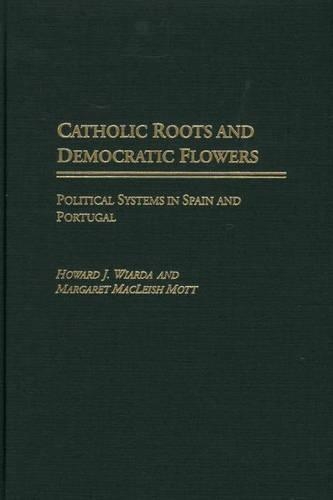
Catholic Roots and Democratic Flowers: Political Systems in Spain and Portugal
(Hardback)
Available Formats
Publishing Details
Catholic Roots and Democratic Flowers: Political Systems in Spain and Portugal
By (Author) Howard J. Wiarda
By (author) Margaret MacLeish Mott
Bloomsbury Publishing PLC
Praeger Publishers Inc
30th April 2001
United States
Classifications
Tertiary Education
Non Fiction
Political structures / systems: democracy
320.946
Physical Properties
Hardback
232
Description
Spain and Portugal have recently adopted European-style democratic and political systems. Yet their pattern of historical development is distinctive and, in many respects, their political systems still reflect unique features. In this provocative text Wiard and Mott analyze the special features of Spanish history: the Catholic tradition, seven centuries of Moorish rule, the Christian Reconquest, and the special nature of Spanish feudalism and nationalism. Building on these foundations, the authors analyze Spanish and Portuguese modern history, the regimes of Franco and Salazar, and the recent transitions to democracy. Successive chapters deal with class structure and interest groups, political parties and elections, the structure of the state and state-society relations, regional politics, and patterns of public policy. While becoming more European socially, culturally, and politically, these two Iberian political systems show also some remarkable continuities with the past, including notions of organic democracy, neocorporatism, and tensions between regionalism and centralism, democracy and authoritarianism, and religiousity and secularism. Students and scholars involved with European politics, comparative politics, Iberian Studies, and transitions to democracy will find this an accessible and provocative analysis.
Reviews
Catholic Roots and Democratic Flowers is an admirable textbook for students who are entering a study of the history and politics of the Iberian countries. Its low-key, balanced style and its careful, restrained judgements will help the introductory student to approach phenomena about which they know little without any burdern of ideological memories that may no longer be pertinent. The inquisitive student might even ask the most important question about contemporary Iberia: Given where they were not so long ago, how did they get to where they are today It might also tempt the senior sociologist or political scientist who has paid little attention to Spain or Portugal in the last wuarter century to ask the same question and perhaps to revise some obsolete stereotypes about the two countries, about Iberian Catholicism, about how to "modernize," and about what it means to be European.-Political Science Quarterly
"Catholic Roots and Democratic Flowers is an admirable textbook for students who are entering a study of the history and politics of the Iberian countries. Its low-key, balanced style and its careful, restrained judgements will help the introductory student to approach phenomena about which they know little without any burdern of ideological memories that may no longer be pertinent. The inquisitive student might even ask the most important question about contemporary Iberia: Given where they were not so long ago, how did they get to where they are today It might also tempt the senior sociologist or political scientist who has paid little attention to Spain or Portugal in the last wuarter century to ask the same question and perhaps to revise some obsolete stereotypes about the two countries, about Iberian Catholicism, about how to "modernize," and about what it means to be European."-Political Science Quarterly
Author Bio
HOWARD J. WIARDA is Professor of Political Science and the Leonard J. Horwitz Professor of Iberian and Latin American Studies at the University of Massachusetts/Amherst. He also is Senior Associate of the Center for Strategic and International Studies in Washington, D.C. A prolific scholar, he is the author of numerous studies, including
